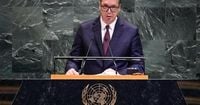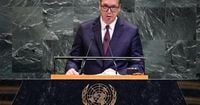Serbia’s capital, Belgrade, found itself at the center of an international investigation this week as police detained 11 individuals suspected of orchestrating a campaign of racial hatred across Europe. According to statements from Serbian authorities reported by the Associated Press and Devdiscourse, the group is accused of carrying out a series of provocative acts, including the placement of pig heads outside Muslim religious sites in Paris—a move widely condemned as an attempt to incite unrest and deepen divisions within French society.
The arrests, which took place in Belgrade and another unnamed Serbian town, followed months of cross-border incidents stretching from April to September 2025 in both France and Germany. The suspects, Serbian police say, acted under the direction of an unidentified foreign intelligence service. While officials have yet to name the agency behind the operation, French authorities have characterized the campaign as a clear effort at foreign interference. "A manifest desire to provoke trouble in the heart of the nation," was how French officials described the pig head incidents, according to the Associated Press.
The details of the scheme are as bizarre as they are unsettling. In early September, pig heads were found near nine mosques in the Paris area, with five of the heads bearing the surname of French President Emmanuel Macron. The grotesque symbolism appeared designed to stoke outrage in France’s already tense social climate. French prosecutors revealed that two foreign nationals were filmed by security cameras depositing the pig heads at the mosques. The pair, whose vehicle bore Serbian license plates, swiftly left France after the acts, with investigators later tracking a Croatia-registered phone they were believed to be using as it crossed into Belgium.
A farmer in Normandy played a surprising role in the investigation, alerting police after two men bought about ten pig heads from him. He noted their car had Serbian plates, a crucial detail that helped authorities piece together the suspects’ movements. The Paris prosecutor’s office confirmed the men were not French citizens but declined to publicly identify their nationality, citing the ongoing nature of the investigation.
While the pig head incidents grabbed headlines, they were not isolated. In May 2025, a Holocaust memorial in Paris, three synagogues, and a restaurant were defaced with green paint. French media said the attack bore similarities to an earlier act of vandalism in May 2024, when a memorial honoring those who rescued Jews during the Nazi occupation was smeared with painted blood-red hands. According to a French intelligence report cited by the Associated Press, that earlier attack was ordered by Russia’s FSB intelligence agency.
French officials have stopped short of directly naming Russia as the mastermind behind the recent mosque provocations. However, they have noted the similarities to previous Russian-linked destabilization efforts targeting France and other European allies of Ukraine. The Associated Press, which has mapped dozens of suspected Russian disruption efforts across Europe, found that France and Germany—both strong supporters of Ukraine—have been frequent targets.
Serbia’s role in the affair has drawn scrutiny, especially given President Aleksandar Vucic’s well-documented ties to Moscow. Serbia is the only European nation that has not imposed sanctions on Russia following its 2022 invasion of Ukraine, despite Belgrade’s formal bid for European Union membership. The arrests come just days after Serbian authorities detained two other suspects accused of training more than 100 foreign nationals to incite riots during Moldova’s national elections on September 29, 2025. Moldova’s pro-Western government ultimately prevailed in that vote, but the episode underscored the region’s vulnerability to foreign interference.
The Serbian police, in a terse statement, described the group’s suspected ringleader as still at large. This individual, officials allege, acted on instructions from the mysterious foreign security agency and was responsible for organizing and training the others to incite hatred, discrimination, and violence in both France and Germany. The police statement did not reveal the leader’s identity or the agency’s name, leaving open questions about the operation’s ultimate sponsors.
Devdiscourse echoed the sense of uncertainty, noting that the foreign agency behind the directives remains unidentified. Still, the pattern of behavior—targeting religious and ethnic minorities, attempting to spark outrage, and operating across borders—fits a broader playbook seen in Europe in recent years. French authorities, for their part, have not ruled out the possibility that these acts are part of a larger campaign to destabilize democratic societies by exacerbating existing social tensions.
“The depositing of pig heads near Paris-area mosques earlier this month was an attempted foreign interference effort,” French authorities said, emphasizing the seriousness of the threat. The incidents, they added, showed “a manifest desire to provoke trouble in the heart of the nation.”
Investigations are ongoing, with French and Serbian officials working in concert to trace the full extent of the network and determine whether additional acts were planned or carried out elsewhere in Europe. Meanwhile, the Paris prosecutor’s office continues to analyze security footage and mobile phone records, hoping to identify any accomplices or higher-level coordinators.
The broader context for these provocations is a Europe increasingly on edge over foreign meddling. Since Russia’s invasion of Ukraine, Western European nations have reported a surge in hybrid attacks—ranging from cyber intrusions to disinformation campaigns and, as in this case, highly symbolic acts of public provocation. France, in particular, has faced repeated attempts to inflame domestic divisions, whether along religious, ethnic, or political lines.
Serbia’s delicate balancing act—maintaining close ties with Russia while seeking deeper integration with the European Union—has complicated its role in these investigations. President Vucic’s refusal to impose sanctions on Moscow has fueled suspicions about Serbia’s willingness or ability to confront Russian influence. At the same time, Serbian authorities have cooperated with European partners in recent weeks, arresting suspects linked to both the mosque provocations and the Moldova election plot.
As the investigation unfolds, European officials are bracing for the possibility of further attempts at destabilization. The pig head incidents, while shocking in their own right, are viewed as part of a broader strategy to undermine trust, provoke outrage, and weaken the social fabric of targeted nations. Whether the recent arrests will disrupt these efforts or merely scratch the surface remains an open question, but for now, the spotlight is firmly on Belgrade—and the shadowy networks that seek to sow discord across the continent.
With tensions running high and the search for the suspected ringleader ongoing, authorities across Europe are watching closely. The case has become a vivid reminder that even the most grotesque acts can serve as tools in the hands of those who wish to divide, destabilize, and distract.


